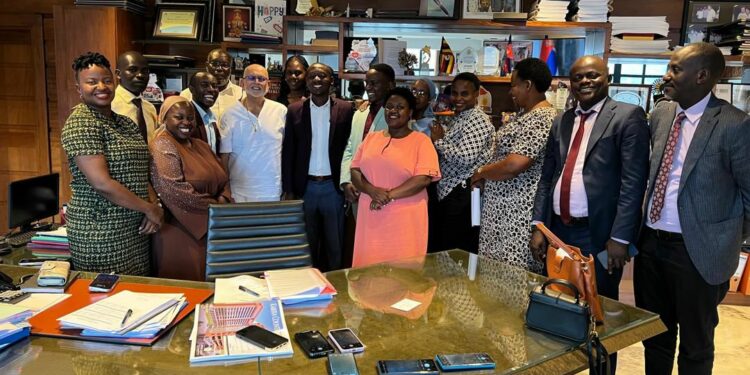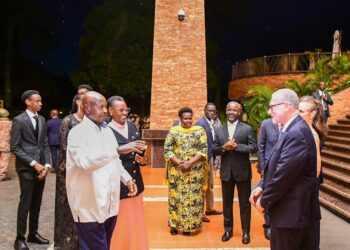Conflict is an inevitable part of any institution. Managed well, it can lead to growth and innovation; managed poorly, it can spell disaster and derail progress. This truth came to light recently at Kampala Parents School (KPS), when teachers staged a protest demanding higher pay. Rather than meeting the agitation with hostility, the school’s proprietor, billionaire Sudhir Ruparelia, demonstrated exceptional leadership by addressing the concerns with diplomacy, empathy, and a forward-thinking approach.
Kampala Parents School: A Legacy of Excellence
Kampala Parents School, a prestigious private primary school under the Ruparelia Group, has a longstanding reputation as one of Uganda’s premier educational institutions. Located in the heart of Kampala, the school boasts state-of-the-art facilities, a dynamic curriculum, and a proven track record of academic excellence. Over the years, KPS has nurtured some of Uganda’s most accomplished professionals, producing alumni who excel in medicine, law, business, and the arts. Its place in Uganda’s education sector is cemented by a commitment to quality and innovation, which continues to attract parents seeking the best for their children.
The Teachers’ Protest: A Call for Fair Pay
The recent protest at KPS stemmed from teachers’ demands for higher salaries. Teachers, understandably, believed that their contribution to the school’s stellar performance, particularly at the national level, warranted better remuneration. While the method—public placards and demonstrations—may not have been ideal, it highlighted the genuine frustrations of educators navigating Uganda’s tough economic conditions.
As the cost of living rises, many professionals across sectors feel stretched, and teachers at KPS were no exception. While it’s true that no salary can ever fully satisfy everyone, competitive pay remains an important driver for retaining and motivating talent. For a school that consistently produces top performers, the call for a pay raise was not unexpected.
Sudhir Ruparelia’s Exemplary Conflict Management
What sets this incident apart is how Sudhir Ruparelia handled the situation. Many employers might have responded with anger or punitive measures, potentially escalating tensions. Instead, Sudhir embraced the moment as an opportunity for dialogue and resolution.
He convened a meeting involving all stakeholders, including school management, teachers, and parents. By bringing everyone to the table, he fostered a sense of inclusion and transparency. Teachers were given a platform to voice their grievances, while management and parents provided valuable perspectives on the challenges and opportunities faced by the school.
The outcome was not just a resolution but a strengthening of relationships. Teachers walked away from the meeting not only satisfied but also expressing regret for the public nature of their protest. The shared selfies between Sudhir and the teachers became a powerful symbol of reconciliation and unity, emphasizing that conflict, when handled well, can bring people closer together.
Why Sudhir Stands Out
Sudhir’s approach to conflict management offers valuable lessons for leaders across all sectors. His ability to remain calm, prioritize dialogue, and focus on solutions reflects a deep understanding of leadership and human relationships. This incident underscores his reputation as not just a successful businessman but also a compassionate and strategic leader.
Sudhir’s decision to engage rather than retaliate is a testament to his belief in collaboration and mutual respect. His actions remind us that great leadership involves listening, understanding, and finding common ground—even in challenging situations.
Lessons for School Managers
School managers across Uganda and beyond can learn from this incident. In educational institutions, where multiple stakeholders—teachers, parents, students, and management—must coexist harmoniously, effective communication is key. Ignoring grievances or responding with hostility only creates divisions. By emulating Sudhir’s example, school managers can build environments where staff feel valued and empowered, which ultimately benefits students and enhances institutional performance.
The Way Forward
The incident at KPS highlights the importance of proactive measures to address potential conflicts before they escalate. Schools should prioritize regular engagement with staff, including forums for feedback and professional development opportunities. Transparent communication about the institution’s financial position and future plans can also foster understanding and goodwill.
For teachers, it’s crucial to adopt constructive methods of airing grievances. Demonstrating professionalism in expressing concerns can strengthen their case and ensure productive outcomes.
Finally, the broader education sector can draw inspiration from KPS’s resolution of this conflict. Schools must recognize that their most valuable assets are the teachers who shape the minds of the next generation. Investing in their well-being is not just a moral obligation but also a strategic decision that pays dividends in the long term.
In Sudhir Ruparelia, Uganda has a leader who not only builds institutions but also nurtures relationships. His handling of the KPS teachers’ protest is a masterclass in conflict resolution, one that deserves both applause and emulation. It is a reminder that, with the right approach, even the most challenging situations can become opportunities for growth and unity.
Do you have a story in your community or an opinion to share with us: Email us at editorial@watchdoguganda.com













